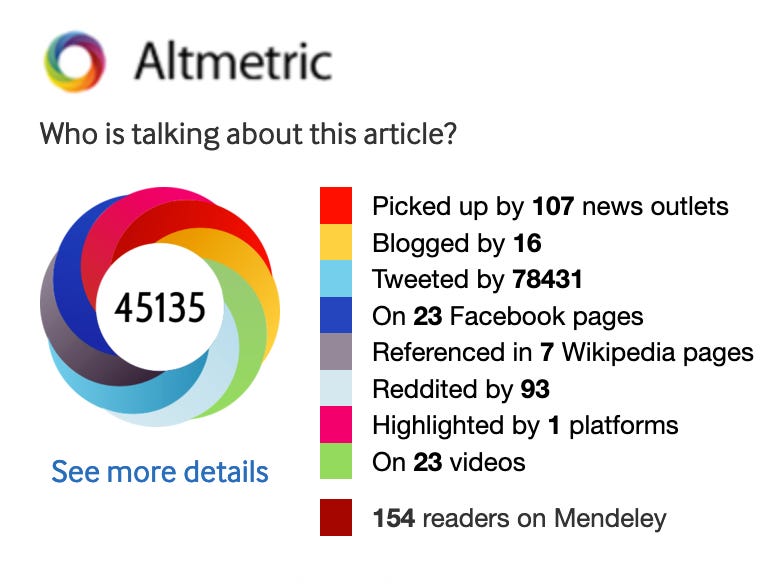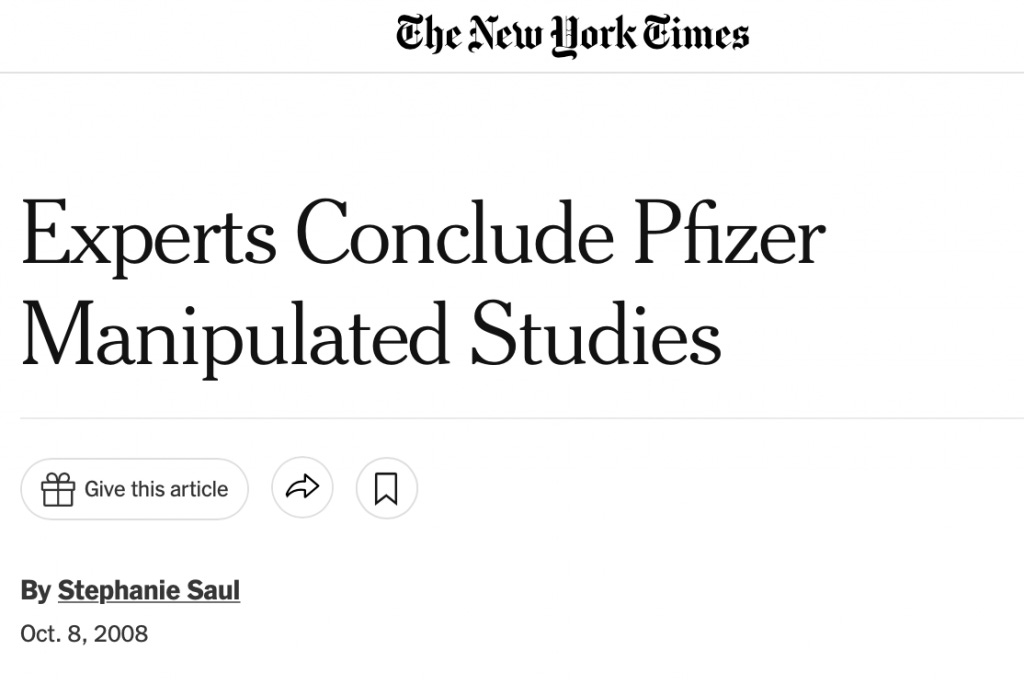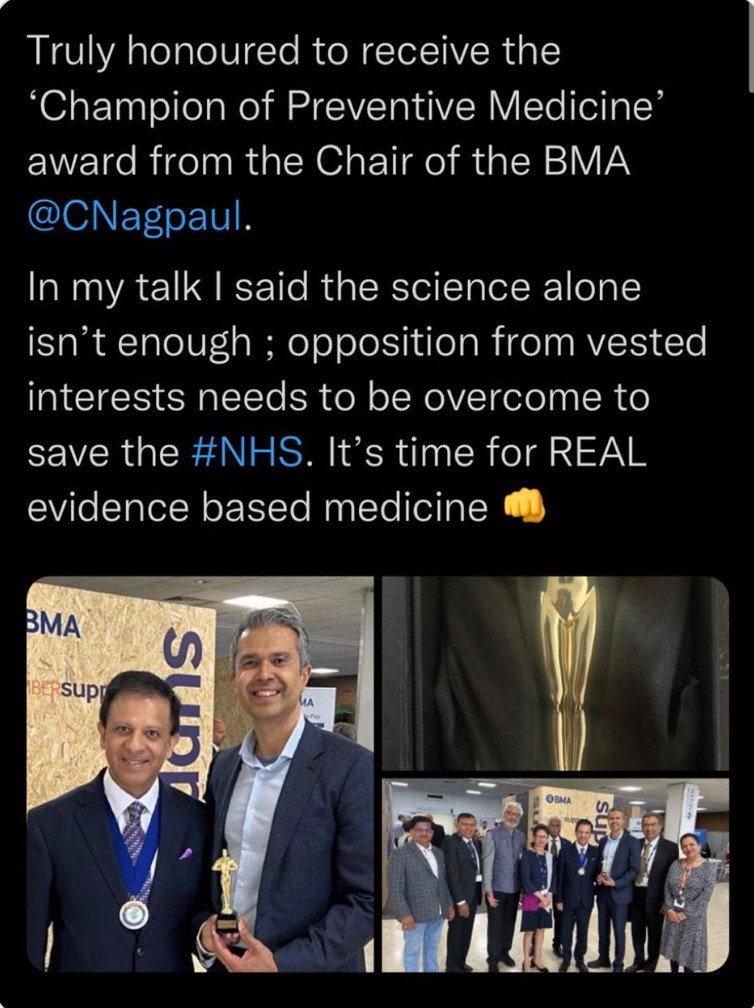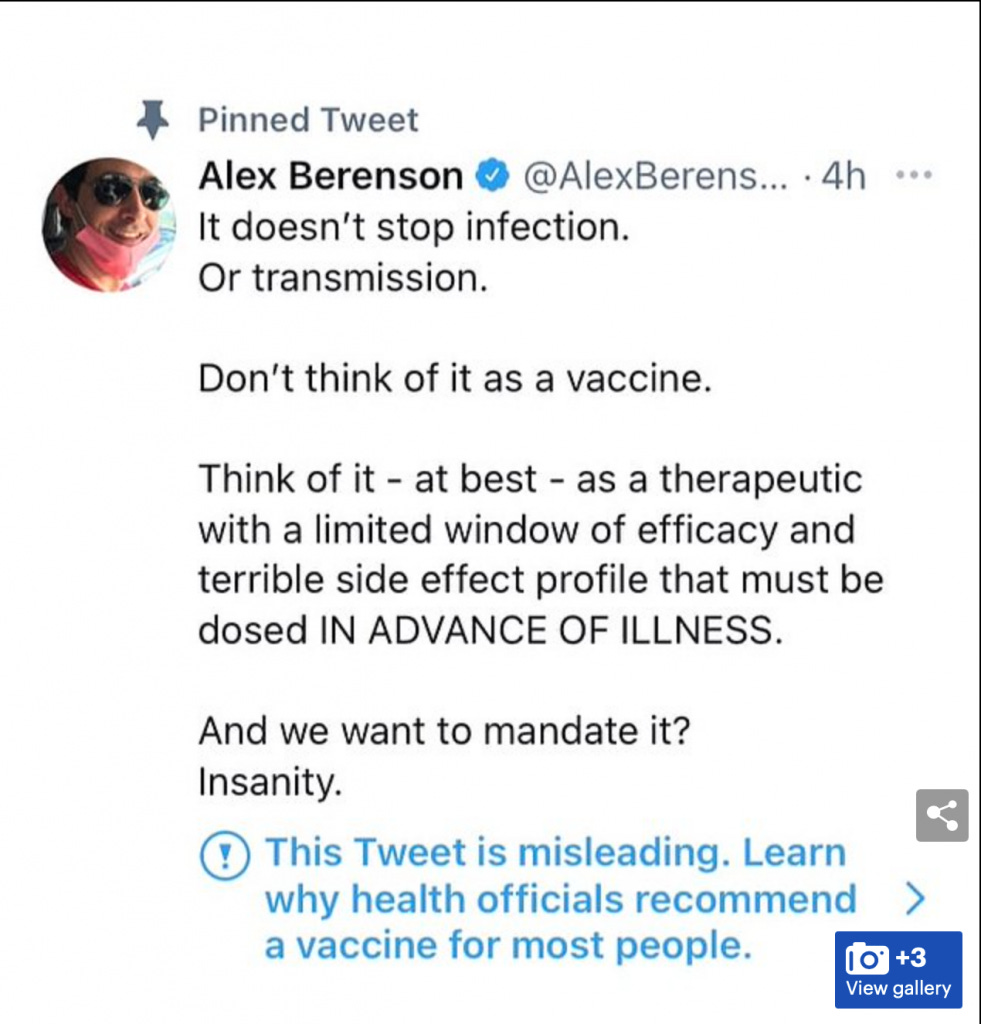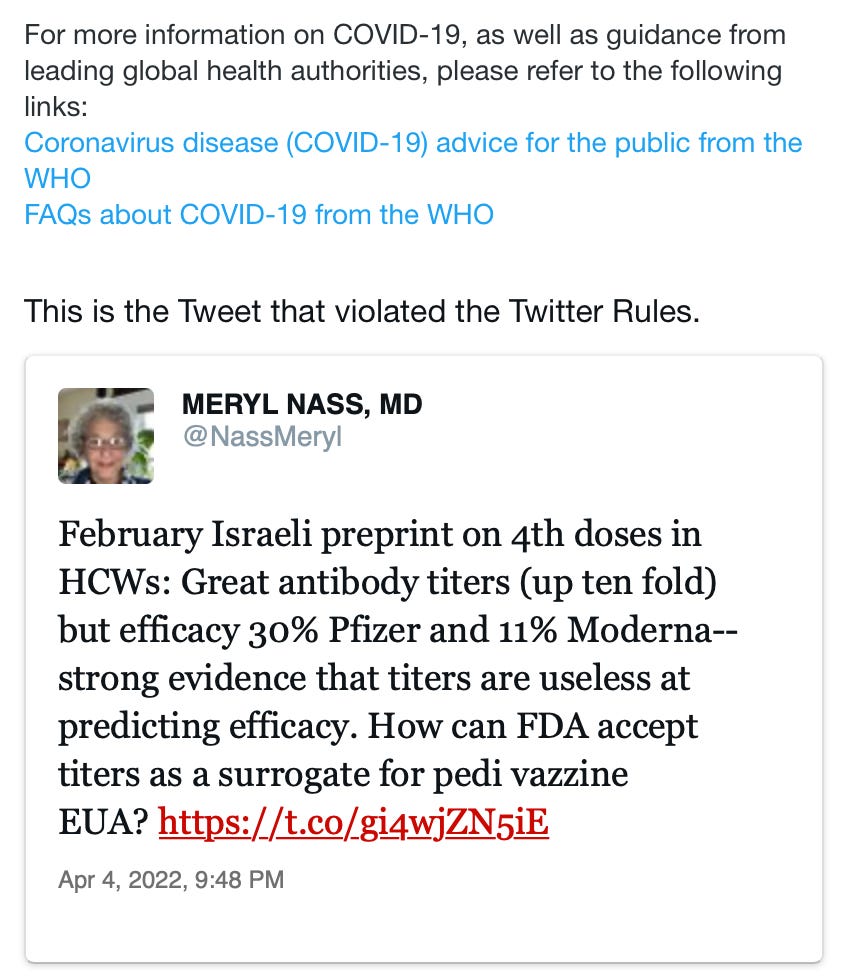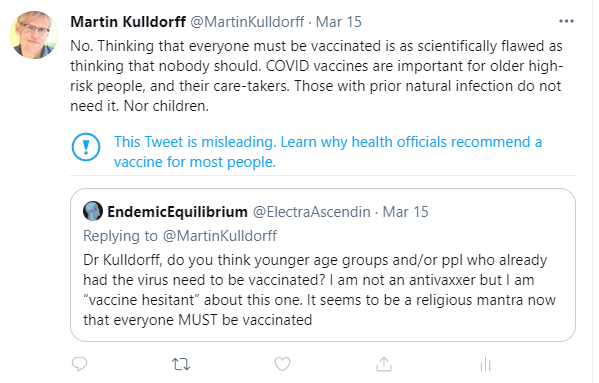Vaccines Are Magic
Current social conventions allow disparagement of drugs and devices, but critique a vaccine … good night, and good luck.
"In a free country, we punish men for the crimes they commit, but never for the opinions they have," President Harry S. Truman, in veto against the anti-communist “Internal Security Act of 1950.”
I’m attending an award ceremony in London this Thursday as a finalist for the Steve Connor Award for Investigative Science Journalism, presented by the Association of British Science Writers (ABSW). My entry is an investigation I wrote for The BMJ about data integrity issues found in Pfizer’s COVID-19 clinical trial, and which was based on dozens of internal company documents, photos, audio recordings, and emails.
“A very good story on a sensitive issue that was reported responsibly, it very clearly spells out why the story mattered,” ABSW judges described the investigation. One method scientists use to judge impact is through a scoring system called “Altmetric” and my investigation has an Altmetric rating of 45,135—the second highest score ever.
Unfortunately, after The BMJ published my investigation, we ran into a political buzzsaw from Facebook, which labeled the article “misinformation” even though they could find no factual errors. Facebook’s awkward political response spurred editors at The BMJ to send Mark Zuckerberg an open letter complaining about his “inaccurate, incompetent and irresponsible” fact check.
Several stories followed:
TK News by Matt Taibbi: The British Medical Journal Story That Exposed Politicized "Fact-Checking" The fact-checkers who flagged Paul Thacker's British Medical Journal article about a Pfizer subcontractor for Facebook admitted they police narrative, not fact.
The New Statesman: In trying to tackle fake news, Facebook is cracking down on real science The platform’s fact checkers found no inaccuracies in a recent BMJ investigation – but limited its reach anyway. Should they be playing moral police?
MedScape: BMJ Slams 'Incompetent' Facebook Fact-Checking of Vaccine Article
UnHerd: BMJ fights back against Facebook fact-checkers. The medical journal was censored for 'misinformation' by the tech giant
However, I am not the only person caught up in the Great Vaccine Scare—hysteria about any and all vaccine criticism, which has reached a fever pitch during the pandemic. In the current social and political environment, you can disparage and heap scorn on products that go through the FDA approval process, if they are called pharmaceuticals or devices, but if you dare critique a vaccine you’re done—good night, and good luck.
Common standards of scientific discourse—data transparency, questioning of efficacy and safety or side effects—simply don’t apply to products if they are called vaccines. Because vaccines are magic.
Two more examples of people being harassed for voicing concerns about vaccines happened in the last couple of weeks. The first is a simply comedy.
Dr. Aseem Malhotra
At the end of June, Dr. Aseem Malhotra gave an invited talk at a function that took place as a side event during a meeting of the British Medical Association. Just so we’re all clear—because people seem to freak out—Malhotra was NOT giving a talk for the British Medical Association (BMA). It was a talk for some international physicians, who happened to have their meeting during a BMA event.
During the talk, Malhotra, spoke about the importance of evidence-based medicine and the history of corruption with pharma, during which he mentioned a preprint that found serious adverse events in the COVID-19 vaccines sold by Moderna and Pfizer. Just so that we’re all clear—because people seem to freak out—Malhotra did NOT give a talk about vaccine side effects. He gave a talk about problems with evidence-based medicine and pharma’s history of corrupt behavior, during which … he mentioned problems with Moderna and Pfizer’s COVID-19 vaccines.
He was praised by several people, for obvious reasons: pharma has a history of corrupt behavior and we need medicine based on facts, data, and evidence—not personal opinion.
During a break that next day, Malhotra received a “Champion of Preventative Medicine” award that was given to him by the Chair of the BMA, who had also attended his talk the previous night. Just so that we’re all clear—because people seem to freak out—Malhotra was NOT given a British Medical Association award. The person who gave it to him, just happens to also be Chair of the BMA.
Malhotra later tweeted a photo of himself receiving the award … and that’s when panic set in and hysteria began—good night, and good luck—like something out of a movie.
Running around with their hair on fire, several prominent physicians began texting Malhotra to take down his tweet, which he then did. The grave concern was that some on Twitter were linking Malhotra’s talk that was NOT a BMA talk, with Malhotra’s award that was NOT a BMA award.
Or something like that.
But even taking down the tweet was not enough. No. Instead, the BMA put out a statement to clarify everything about the non-BMA award—it was presented at an “independently organized fringe dinner,” the BMA chair said—which seems to have been driven by Malhotra’s non-BMA talk mentioning the preprint about COVID-19 vaccine side effects.
If you’re reading this and scratching your head wondering how a tweet could rip a hole in the vaccine universe, thank yourself for not falling under the spell of vaccine magic where minor denunciations must be warded off with counter enchantments and press release potions.
“There’s a lot of money and many careers behind these vaccines,” Malhotra told me.
“Follow the science”
Some days after this bizarre, confusing cockup—it’s okay if you’re confused, because I still am—reporter Alex Berenson announced that he was no longer cancelled by Twitter and his lawsuit against the company had been resolved. “The parties have come to a mutually acceptable resolution,” Berenson wrote on Substack. “I have been reinstated. Twitter has acknowledged that my tweets should have not led to my suspension at that time.”
As reported by The Daily Mail, Twitter suspended Berenson for a tweet last August where he wrote that COVID vaccines do not prevent infection or transmission of the virus—information that is scientifically accurate.
After he was reinstated last week, Berenson immediately tweeted this same message:
https://twitter.com/AlexBerenson/status/1544704266249674754
But Berenson is not the only person who Twitter censored for writing about science that is inconvenient for the biopharmaceutical industry. Earlier this April, Twitter cancelled physician Dr. Meryl Nass for tweeting the conclusions from the preprint of a clinical trial by Israeli scientists (the NEJM later published the preprint as a letter.)
Nass told me she does not understand how she desecrated vaccine magic. “I guess you have to ask Twitter that,” she emailed me. However, her sacrilege seems to involve repeating the study’s conclusions that antibody titers do not correlate with vaccine protection.
Oddly enough, former CDC Director Tom Frieden made this exact same point last September to The BMJ, “We don’t know that antibody level is what determines protection.”
But the most disturbing incident happened last August, when several media outlets reported that Dr. Marion Gruber, the director of the FDA’s vaccines office, would retire at the end of October, and her deputy, Dr. Philip Krause, would leave in November. As reported by EndPoints:
A former senior FDA leader told Endpoints that they’re departing because they’re frustrated that CDC and their ACIP committee are involved in decisions that they think should be up to the FDA. The former FDAer also said he’s heard they’re upset with CBER director Peter Marks for not insisting that those decisions should be kept inside FDA. What finally did it for them was the White House getting ahead of FDA on booster shots.
A few weeks later, on September 13, Gruber and Krause published a viewpoint in The Lancet that argued “Current evidence does not, therefore, appear to show a need for boosting in the general population, in which efficacy against severe disease remains high.” The viewpoint was signed by over a dozen other experts including members of the World Health Organization.
As reported by the Associated Press:
After revelations of political meddling in the Trump administration’s coronavirus response, President Joe Biden has promised to “follow the science.” But the review raises the question of whether his administration is moving faster than the experts.
Georgetown University's Larry Gostin told the AP, “It’s always a fundamental error of process to make a scientific announcement before the public health agencies have acted and that’s exactly what happened here.”
But Gruber and Krause are not the only vaccine experts blacklisted from federal service for expressing a scientific view that is not embraced by President Biden’s “follow the science” administration.
Martin Kulldorf is a biostatistician and member of the FDA’s Drug Safety and Risk Management Advisory Committee, who has spent decades studying disease outbreaks and side effects of vaccines and drugs. But the CDC booted him from their advisory committee on vaccines for saying the agency should not have paused a COVID-19 clinical trial.
https://twitter.com/MartinKulldorff/status/1467124136602390537
After the CDC blacklisted him for expressing a scientific view that was “too pro-vaccine” Twitter then censored Kulldorf for a tweet expressing a scientific view that was “anti-vaccine.”
No longer a good guy
But the most vicious and prolonged attack against someone complaining about COVID-19 vaccines concerns Steve Kirsch, a serial entrepreneur and general good-guy who established a $75 million charitable fund. When Hillary Clinton presented Kirsch and his wife with a humanitarian award in 2003, the announcement read, “Founder of the search engine Infoseek, Kirsch sold his company and funded the Kirsch Foundation. Cancer research, clean water, education and the well-being of children are close to the Kirschs' hearts.”
But as Kirsch explained last December, none of this information can be found any longer on his Wikipedia page. “After I spoke out against the vaccines, Wikipedia totally changed my profile over time from a good guy into a menace to society.” In the article, Kirsch provides a timeline of changes made to his Wikipedia page by vaccine extremists trying to damage his reputation and make him shut up. “Because I’m a threat, it’s important to discredit me.”
Of course, none of the science writers working at mainstream outlets— New York Times Science Desk, Nature Magazine, Scientific American, Science Magazine, and UnDark Magazine—have done an Edward R. Murrow and spoken out in alarm and dismay about this state of fear and paranoia. Oh no! Most science writers are too busy doing their scicomm—helping and supporting the government to promote their position on vaccine policies.
For example, 18 months ago, the FDA released a briefing document on the Vaccine Adverse Event Reporting System (VAERS), a somewhat problematic database of vaccine side effects. “CDC and FDA will perform routine VAERS surveillance to identify potential new safety concerns for COVID-19 vaccines,” reads the executive summary.
Part of this plan involved performing Proportional Reporting Ratio (PRR) data mining:
CDC will perform PRR data mining on a weekly basis or as needed. PRRs compare the proportion of a specific AE following a specific vaccine versus the proportion of the same AE following receipt of another vaccine (see equation below Table 4). A safety signal is defined as a PRR of at least 2, chi-squared statistic of at least 4, and 3 or more cases of the AE following receipt of the specific vaccine of interest.
But did any reporter follow up on the government’s promise to examine VAERS? It doesn’t appear so. That task was left to Children’s Health Defense which filed a FOIA asking to see evidence that the agencies analyzed the VAERS database. Oddly enough, when they asked for documents to explain how the CDC performed the promised PRR data mining on a weekly basis, here’s the CDC response:
“Unfortunately, vaccines have become a type of religion,” said Tom Jefferson, Senior Associate Tutor University of Oxford who led many of the Cochrane Reviews on the flu vaccine. “We are regressing to the 80s where you pick and choose your evidence. All of this has been exacerbated by social media and personal attacks.”
Republished from the author's Substack.



